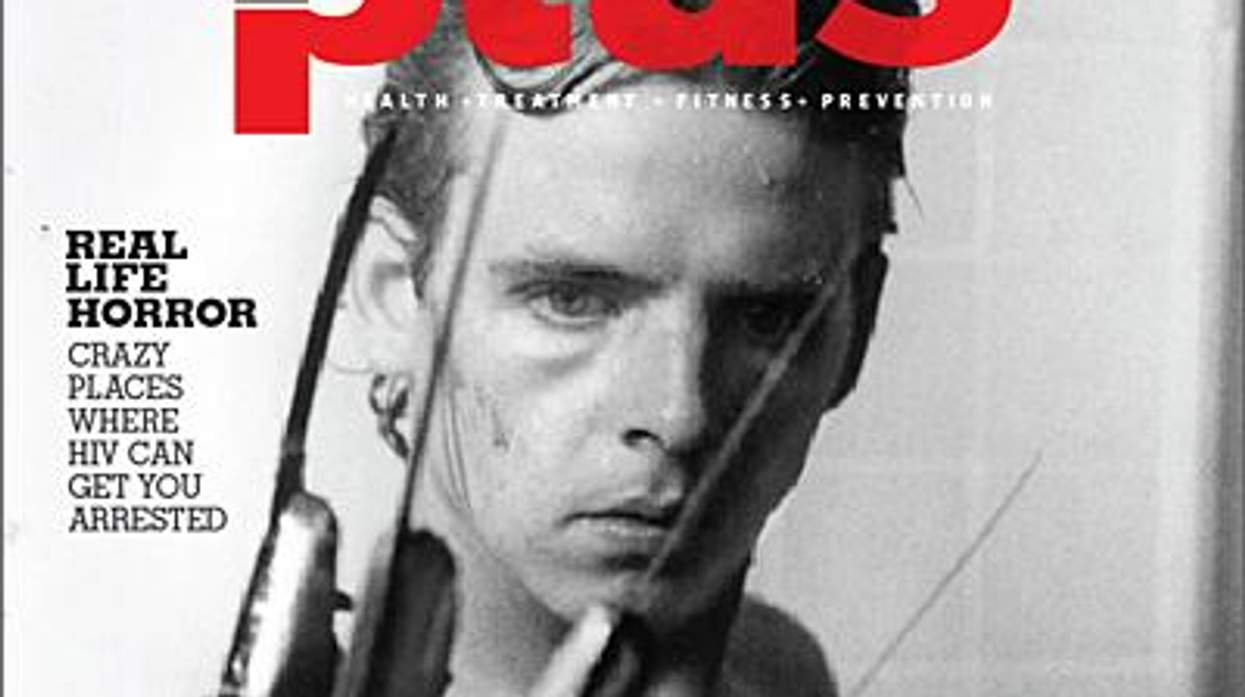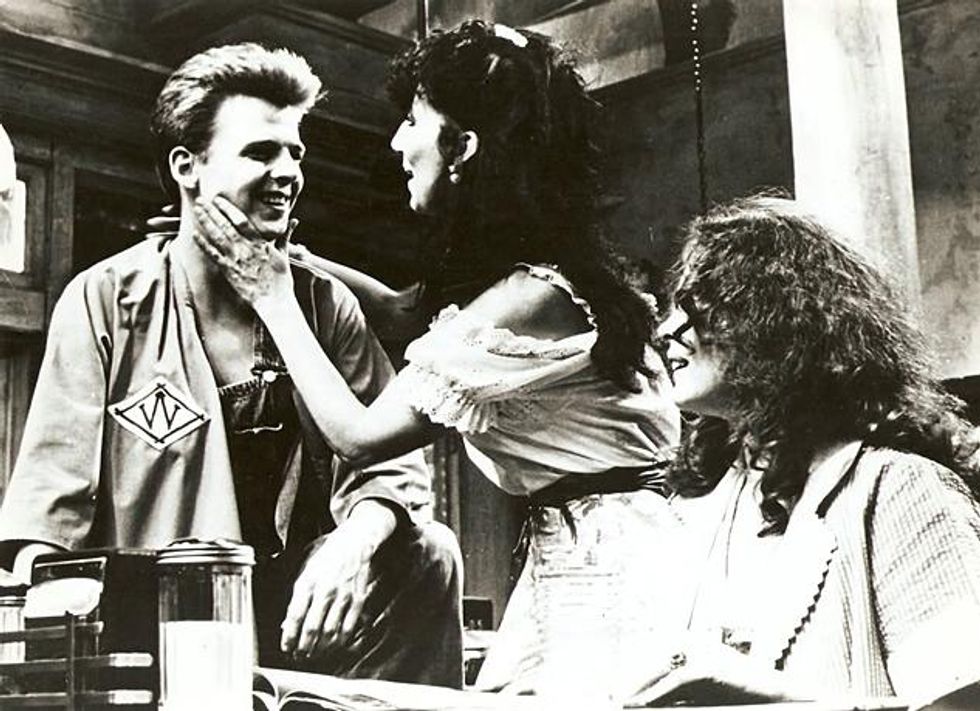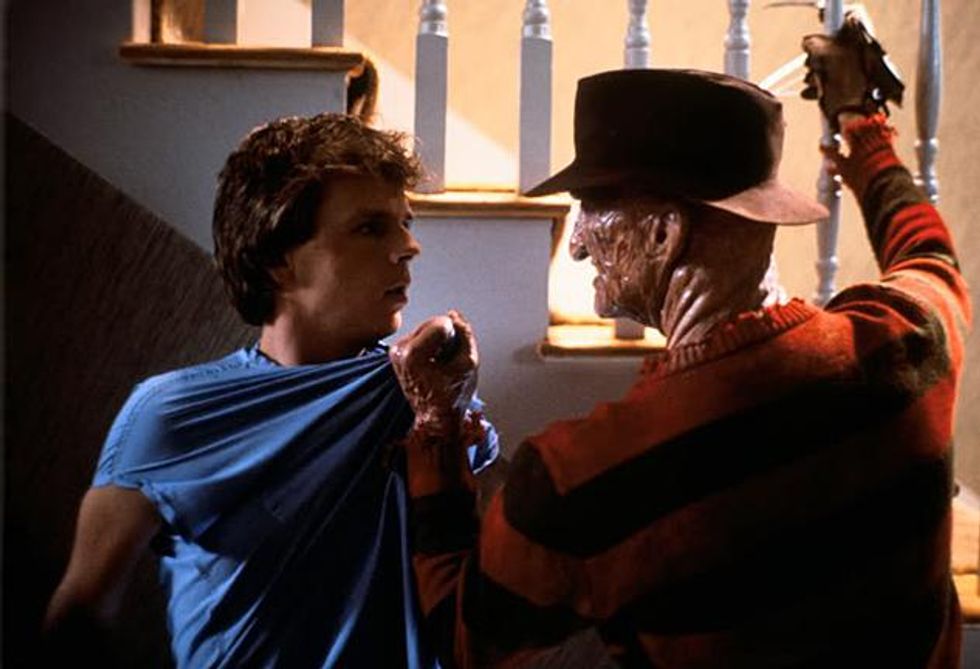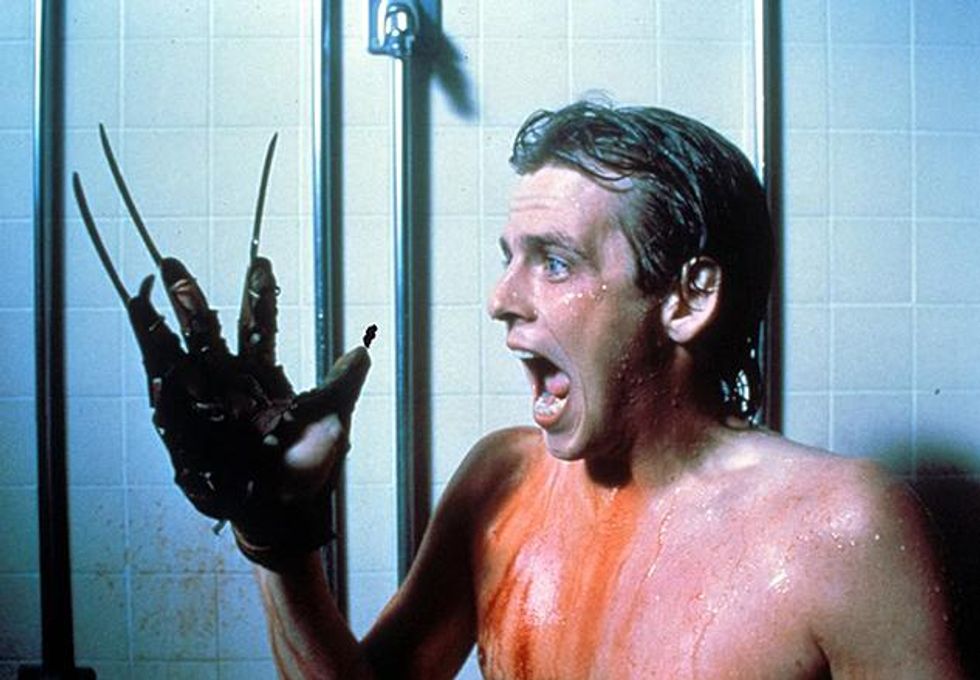Editor's Note: The following story is reposted here in partnership with HIV Plus magazine.
Mark Patton smiles as he pulls up the right sleeve of his grey sweater, revealing the name "Jesse" on his forearm. "I have every character I've ever played tattooed on my body," he says. "But I've decided to put the name Lazarus next, because that's who I am. I've walked out of the grave time and time again."
It's been more than 25 years since he played the part of Jesse Walsh in A Nightmare on Elm Street 2: Freddy's Revenge, but the 49-year-old actor has had more in common with the boy whose body Freddy Kruger once wanted to possess than most people know. Today, sitting in a coffee shop in San Francisco, Patton shares with me how the theme of survival permeates his life.
Raised in Riverside, Mo., Patton says he often felt like an outsider in his hometown. "I had a rough time in school," he says. "I was a very pretty boy and where I come from everyone looks exactly the same. If you're even the slightest bit different you're a target. I was a hypersensitive kid and I was bullied quite a bit."
The confident man across from me is nothing like the young boy he describes. He seems perfectly at ease in a pair of khakis and deck shoes, nibbling on a pulled-pork sandwich and sipping a Diet Coke as a steady stream of pedestrians trickles by on the sidewalk outside. It's a transformation he says began to take shape when his father gave him some words of advice after he came home one day in tears because several of his classmates were bullying him. "My dad took me in the bathroom and said, 'Look in the mirror. Look in that man's eyes. That's who you're going on this trip with. Know him, be on his side.'"
With his sense of self-worth beginning to grow, it wasn't long before Patton discovered both his passion for acting and his attraction for other men -- neither of which helped him assimilate into his southern home state. "I don't think I was ever closeted, to be honest with you," he says. "Once I figured out I was gay, I always acted on it. But I was always afraid some redneck would kill me on a back road. That's where I thought I would end up because that's where I come from. Theater provided me a safe space."
After graduating high school, Patton bought a plane ticket and moved to New York with $132 to his name.
"When I got off the plane to New York, I breathed my first relaxed breath, probably in my life. Because I realized I was safe," he says. "There, all of my negatives turned into positives. Things like the way I walked became an attraction as opposed to something people would laugh at."
 Above: Patton, Cher, and Sandy Dennis in
Above: Patton, Cher, and Sandy Dennis in Come Back to the Five & Dime Jimmy Dean, Jimmy Dean.
Feeling a newfound sense of freedom and self-esteem, Patton found success quickly both professionally and socially in New York City. Within a few months, he began booking work acting in commercials and off-Broadway plays and made a new circle of gay friends. A few years later, he got the break of a lifetime when he landed the role of Joe Qualley, a gay character, in the Broadway play Come Back to the Five & Dime Jimmy Dean, Jimmy Dean opposite Hollywood heavy-hitters Cher and Kathy Bates. It was a role Patton felt he was born to play.
"I knew I was going to be hired for Jimmy Dean," says Patton. "It was one of those moments where you knew it was your destiny." The show was a success, and soon Patton found himself in Los Angeles with the rest of his cast mates working on a film adaptation of the Broadway hit. But just as the fresh-faced blond boy from Missouri's star began to rise, he discovered a darker side to the industry he had come to love.
"I remember my first manager came to my house, went to my closet, and told me what I could and couldn't wear," recalls Patton. "All the things I could wear, she threw them on the floor in the closet and said, 'This is the way normal boys dress. They wear wrinkled and dirty clothes. And the other things you really love? Don't wear them.'" He quickly realized the open and free life he enjoyed as an out actor in New York was not accepted in the homophobic culture of 1980s Hollywood.
"When I started working in New York, I didn't have the common sense to keep my sexuality a secret," Patton says. "I wasn't famous. I was just a kid going to auditions for commercials and stuff. In New York I would go out to gay bars and it was no big deal, but in Los Angeles, I was told I wasn't allowed to step foot in West Hollywood because agents would post people in the L.A. gay bars so they could sabotage the career of any actor who competed with one of their clients. It was very cutthroat."
Quickly, Patton found himself in a closet built by those around him who were guiding his career. "They wouldn't even let me do certain interviews," he adds. "I remember getting an interview request from The Advocate after we made Jimmy Dean and they told me I absolutely couldn't speak with a gay magazine, even though I was playing a gay character. I think they were scared I would say something about my sexuality, and they were probably right."

Grudgingly, Patton went along with the real-life charade he was forced to play in his new Hollywood life, and in 1985 he landed his now-iconic role in
A Nightmare on Elm Street 2. But he was playing one nightmare on film while living another behind the scenes.
"By that point, AIDS was all around me. Everyone I knew was getting sick," he says. To make matters worse, the gay subtext of the
Elm Street sequel, which was purposefully woven into the script by screenwriter David Chaskin, began to be noticed by fans and critics shortly after the film's release. But rather than admit what he'd done, Chaskin blamed Patton for making the film -- which included a scene where Patton's character runs into his gym coach at a gay leather bar and lines like "He's inside me, and he wants to take me again!" -- too gay.

"David would just blame me any time it came up alluding to something along the lines of, 'Well, he's a big old fag and he chose to play the part in a big old fag way.'"
However, the darkest moment of Patton's career came in 1987. He was cast to play what would have been a groundbreaking gay character on a major network television series, but what happened next shattered the promising actor's Hollywood dreams. "It was what I would consider my last true hardcore audition," Patton remembers of nearly getting a part as a gay character on CBS. He was sitting at table with nearly a dozen other men. "They began to ask me if I would be comfortable playing a gay character and telling people I was straight if they began to question my sexuality? I remember looking around that table and I knew every one of those men were gay. All I could think about was how everyone I knew was dying from AIDS and we were having this bullshit conversation. My heart just broke and that was the line for me. I knew I would never be able to do what they were asking, so I walked away from Hollywood and decided to move on to a place where it was totally acceptable to be gay."
Before long, Patton had re-branded himself as a successful interior decorator, but just as he'd risen from the self-inflicted death of his movie career, he was about to endure another trial. After battling what he thought was a severe case of bronchitis, Patton underwent a battery of tests and discovered he was not only HIV-positive, but was also battling a slew of other infections, including pneumonia, thrush, and tuberculosis. "I found out on my 40th birthday and three days later I was in the hospital," Patton says. "But because of the infections I had, they made me take tuberculosis medicine and that didn't mix with those older HIV meds. There were so many side effects. It was like I was poisoned. " He pauses for a long moment before he continues. "I almost died there, but thankfully my friends took me to an AIDS health clinic, which saved my life."

Slowly Patton's health improved and he began what he describes as the happiest chapter in his life to date. He moved to Mexico where he met and fell in love with Hector Morales Mondragon, the man who would later become his husband. The two of them currently own and run an art store in Puerto Vallarta where Patton also sells works of his own, including a line of painted handbags he designed.
In 2010, Patton's life had come full-circle when the makers of
Never Sleep Again, an exhaustive documentary about the
Nightmare on Elm Street franchise, tracked him down and asked him to speak candidly about his experience as a part of the Elm Street legacy. It was then he learned that
Nightmare on Elm Street 2 had gained a cult following and was being celebrated by both the horror film and LGBT communities as one of the gayest horror movies of all time. The subtext that once caused him grief had now made him a hero for fans. Patton agreed to appear in the documentary and was finally able to freely address his sexuality to the fans of Freddy's franchise. Vindicating Patton was that the documentary also featured screenwriter Chaskin, who finally admitted on record he had intentionally woven gay subtext into the script of
Freddy's Revenge.Since the release of
Never Sleep Again, Patton has toured horror conventions around the world where he is now embraced as the first "male scream queen" of mainstream horror. He also sells T-shirts featuring some of the more titillating classic lines from the film as well as a few of the antigay slurs, such as "Jesse is a Homo," that were once used to describe his now-iconic character--another negative that has become a positive in his life. Most of the money he earns from his appearances is donated to HIV treatment organizations and LGBT youth charities such as The Trevor Project.
He tells me he's currently planning to release a documentary of his own, titled
There is No Jesse, which will focus both on his part in the Elm Street phenomenon and the real-life nightmares he has endured since filming the movie. He's been gearing up for the emotional journey that will inevitably follow as he shares the truth about his most personal battles and his HIV status.
"The only thing we're waiting for is me," he says. "It's not that I'm embarrassed in any way, but I'm a private person, and I have a different life now. These are parts of my story that have never been published before, and I've had to think about whether or not I was prepared to have those conversations over and over again. But I've decided to share them with you today because I think I'm ready to tell the next part of the story." He straightens up in his chair and smiles again before adding, "It's my obligation to tell it the way it happened, and it's a story that needs to be told. I've looked at my mortality, and I lived through it."
As he finishes his Diet Coke he says, "That advice that my father gave me all those years ago has proved to be true. I'm authentically me, and now every day I feel more free. I'm so thankful I have so many stories to tell and have lots of different ways I can tell them. Whether it's cooking you dinner, painting you a purse, or making a movie -- it doesn't matter. I'm a storyteller and I have a fabulous memory. So watch out because I don't forget a thing."




 "David would just blame me any time it came up alluding to something along the lines of, 'Well, he's a big old fag and he chose to play the part in a big old fag way.'"
"David would just blame me any time it came up alluding to something along the lines of, 'Well, he's a big old fag and he chose to play the part in a big old fag way.'"


































































Charlie Kirk DID say stoning gay people was the 'perfect law' — and these other heinous quotes